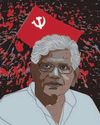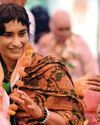Gurmehar’s deepest frustration is that no one, not even the liberal media, has bothered to see her as a flesh and blood person with feelings.

When Gurmehar Kaur was six years old, her mother took her to buy kitchenware from the crowded utensils bazaar in Saharanpur, Uttar Pradesh. Her father, Captain Mandeep Singh, martyred in a militant attack in north Kashmir just a few days after the close of the Kargil war in 1999, had already been dead for three years. Gurmehar was visiting her maternal grandparents.
Suddenly, taking her unsuspecting mother by shock, the little child grabbed a knife on sale in the market and lunged towards a woman in a burkha. The woman was a stranger but the veil was an irrational trigger for anger and revulsion. “I had come to conflate all things Muslim with Pakistan, such was the rage I carried inside me,” Gurmehar told me, visibly shaken at being at the centre of a national controversy.
The young literature student has been threatened with rape, hounded, mocked and mercilessly trolled after an old pro-peace video she made last year resurfaced on social media. A placard she held up in the short film, “Pakistan did not kill my father; war killed him,” was isolated and decontextualised from the rest of the video to caricature a young woman’s simple idealism.
What most people don’t know about Gurmehar is the story of her complex and painful journey from a child who was bitter and filled with hate— “I thought every Islamic symbol, even in my own country, has something to do with Pakistan”—to this moment when she describes herself as a “peace activist.” Gurmehar says this childhood notion of subconsciously conflating Muslims with Pakistan and thus seeing both as the ‘enemy’ came from the prejudiced thoughts and words she heard around her; not in her immediate family, but neighbours, friends, their parents and so on.
Bu hikaye THE WEEK dergisinin March 12, 2017 sayısından alınmıştır.
Start your 7-day Magzter GOLD free trial to access thousands of curated premium stories, and 9,000+ magazines and newspapers.
Already a subscriber ? Giriş Yap
Bu hikaye THE WEEK dergisinin March 12, 2017 sayısından alınmıştır.
Start your 7-day Magzter GOLD free trial to access thousands of curated premium stories, and 9,000+ magazines and newspapers.
Already a subscriber? Giriş Yap

Themes Of Choice
As Savvy Investors Seek New Avenues, Thematic Mutual Funds Are Gaining Popularity

A golden girl
One of India's most formidable beauties passed away earlier this month. The odd thing is she would absolutely hate this obituary; she hated being written about and avoided publicity for all of her nine decades. Indira Aswani was 93 when she died. But anyone who encountered her, even briefly, was in such awe of her grace and poise, and one could not but remember her forever.

The interest in wine is growing delightfully in India
The renowned British wine writer and television presenter Jancis Robinson, 74, recently came to Delhi and Mumbai to reacquaint herself with India's wine industry. This was the Robinson's fourth visit to India; the last one was seven years ago. On this trip, Robinson and her husband, restaurateur Nicholas Lander, were hosted by the Taj Hotels and Sonal Holland, India's only Master of Wine.

United in the states
Indian-Americans coming together under the Democratic umbrella could get Harris over the line in key battlegrounds

COVER DRIVE
Usage-driven motor insurance policies offer several benefits

GDP as the only measure of progress is illogical
Dasho Karma Ura, one of the world's leading happiness experts, has guided Bhutan's unique gross national happiness (GNH) project. He uses empirical data to show that money cannot buy happiness in all circumstances, rather it is family and health that have the strongest positive effect on happiness. Excerpts from an interview:

India is not a controlling big brother
Prime Minister Tshering Tobgay considers India a benevolent elder sibling as the \"big brotherly attitude\" is happily missing from bilateral ties. He thinks the relationship shared by the two countries has become a model of friendship not just for the region, but for the entire world. \"India's attitude is definitely not of a big brother who is controlling and does not allow the little brother to blossom and grow,\" says Tobgay in an exclusive interview with THE WEEK.

Comrade with no foes
Lal Salaam, Comrade Yechury-you were quite a guy!

Pinning down saffron
In her first political bout, Vinesh Phogat rides on the anti-BJP sentiment across Haryana

MAKE IN MANIPUR
Home-made rockets and weapons from across the border are escalating the conflict